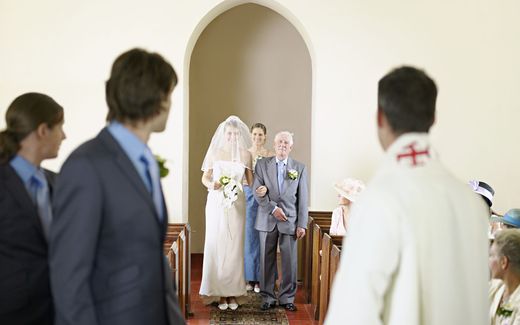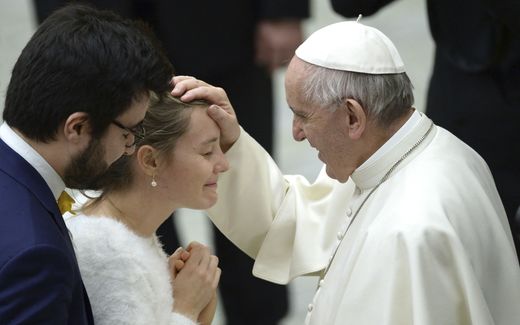Every marriage needs a Third Person
12-07-2022
Opinion
Christine Stam-van Gent, RD

Photo Unsplash, Євгенія Височина
Opinion
A marriage that can withstand all storms, who does not want that? Christine Stam-van Gent expresses recognisable issues in this essay and shows a way against the spirit of the time.
The realisation that you must work to keep your marriage good, even if it goes quite well, is abundantly present among Christians. Many congregations offer marriage counselling. The supply of courses, relationship weekends and therapies is large. Often, these events aim to rake up the fire of the first love. Spend time together, laugh together, touch each other, communicate from heart to heart, and pray together regularly.
I am not saying that this is all nonsense. Many marriages suffer from poor communication. It is incredible how much can be changed if men learn to listen first instead of finding a solution immediately. Or if women learn to express themselves in terms of desires instead of accusations.
Yet, there are enough couples who have done much in these areas and whose marriage is still blown away by forms of headwinds which they did not expect. Can you be prepared for this?
Chores
Just before he would propose to her, the second husband of the missionary Elisabeth Elliot wrote her his "geriatric letter", as he called it. Addison Leitch was 60 years old at the time, and Elisabeth was 42. In his letter, he showed her what she could expect if she married an old man: she would have to drive the car, clean his glasses, and who knows how many more humble chores. At the end of the letter, he wrote: "Here I am, everything from me, for you, forever. But what a strange offer!"
Maybe it is not a bad idea to look at this down-to-earth side of marriage and ask yourself what you should and should not expect from it. Especially women (as I see it, but concerning men, I do not know exactly) tend to have high expectations of their spouses. He must sense their feelings, understand them, reassure them, and protect them.
But almost no man can fulfil all these roles at the same time, even if he wanted to. In the words of Ruth Bell Graham (the wife of pastor Billy Graham): "Foolish is the wife who expects from her husband what only Jesus Himself can be." To receive wisdom and protection, you must go to Him daily. And to guarantee your emotions are sensed and understood, I would invest in a few close friendships. The same probably applies to men, even though these friendships will look somewhat different. But for both men and women, it is true: do not expect too much of marriage. Be grateful for what you receive and accept what is not there.
Socks
Most people will not show their spouse the least attractive side of marriage as Addison Leitch did, especially when there are no difficulties for the time being. Which couple will take time – amidst festivities and wedding preparations – to tell each other: You should know that you will have to pick up my dirty socks repeatedly. You will notice that I try to keep everyone out except for you. Sorry, but you will have to save yourself if you are in hard times emotionally. You will have to hear many times how badly you disappoint me.
Even if we would honestly want to try this, we simply cannot do it; because we do not know ourselves well enough, especially not who we are as a spouse. Married life will reveal things you did not know about yourself and the other. By the way, that thought can be helpful if your eye catches that attractive man or woman of your neighbour, who seems to have everything that your partner has not. The only one who can really tell who this person is is married to him or her.
The costs of marriage can never be overcalculated. Even Addison Leitch, with his touching attempt to create a realistic image, was not correct. After four years of marriage, he died of cancer. The sorrow that Elisabeth had to endure was of a very different kind than they ever expected.
Mystery
But the last sentence of Addison's letter is striking: what did he have to offer Elisabeth? That does not only apply when the age difference between spouses is significant. We, weak, sinful people, initially have no idea how big the step into marriage is, of the enormous consequences it has in several areas, and which sacrifices it will require from us.
Marriage is a tremendous thing. It has an earthly side but also a heavenly dimension. It is miraculous that a human wants to be there for you entirely, who will put himself to sleep next to you every night, who takes care of you if you cannot do it yourself anymore. And then there are the dirty socks, the long hairs you have to clean up in the shower time and time again. And there is that mystery, that high standard of the image of Christ and His Church which marriage symbolises.
A promise that goes beyond our abilities
Marriage is a perilous adventure. When we vow each other faithfulness in good and evil days, in poverty and riches, in sickness and health, we make a promise that we cannot keep, that goes beyond our abilities.
Almost no one shies away from that on the big day itself. We found the dearest human on earth, and we promise to stay with him or her, expecting that the love will remain and that it will bring us safety, security and comfort.
It even becomes more and more popular to formulate your own wedding vows. Often these vows are about what we feel for the other. In itself, it is not wrong to give words to these emotions, just like it is not wrong to cherish our romantic feelings and start our wedding with high expectations.
But the question remains, how solid this foundation is. How realistic our expectations are. Whether they can withstand storms. We may think we have entered the happiest marriage ever, while the romanticism evaporates as a morning cloud during our honeymoon already.
Who would dare to get married? Only those who believe that all things are possible with God; also keeping a promise which is that large. Only the person who keeps these three things in mind – the difficult task, his own inability, as well as the God Who works the impossible things – is genuinely prepared for marriage.
Sacrificing
The critical task is that we are to be followers of Christ in sacrificing ourselves for the other. That is not a specific requirement only for married people. In the Bible, there are barely any guidelines for marriage, but there are for dealing with our neighbours.
"By this, we know love because He laid down His life for us. And we also ought to lay down our lives for the brethren. (1 John 3:16)." Thus, the first 'brother' is your marriage partner. The strange thing is that we often deal friendly with people outside the home and offer them goodness and friendliness. But inside the home, the norm is usually hung on the coat rack.
The neighbour at home has to endure your frustrations, is hit by your tiredness, and does not receive a friendly word if the friendliness is gone.
I paint a black-and-white picture. Reality is often mixed. Good and bad days follow each other, sometimes dependent on our mood. But the core of the issue is that our least attractive sides are revealed at home at some point. And we think that this is normal, that we have the right to behave that way at home. But the principle of loving the other as much as yourself applies, especially at home.
Use of soap
As spouses, you can encounter large issues: psychological problems, traumas, addictions, innate sins. But love is more disturbed by the chain of the thousand of little annoyances: the fact that she never puts the cap on the tube of toothpaste, the way he eats his soup.
In her book with letters to the young bride ("By love refined"), Alice von Hildebrand writes that she was annoyed by the way her newlywed husband used the soap. Every time he had washed himself, the soap swam in a bath of water, a dirty, slimy substance. She pointed that out to him. From that day on, he developed the habit of leaving the soap behind so dry that she could not see whether he used it or not. Alice was so touched by this, that she only had to think of the soap for a wave of love and gratefulness to wash over her for this little, but so crucial token of love.
True love is seen in the little things. Like Alice writes to the young bride: "When your love deepens, you will experience how big love is, how it will saturate even the littlest aspects of life more and more."
Help, I married the wrong person
As long as the love is there, it will not be hard to bring little sacrifices for each other. Although... in a time like this, when we all learn how to indicate our own boundaries – this is who I am, you have to accept me like this – it would not be bad if we would hang a tile on the wall saying: "Sacrifice yourself in the little things and love will become bigger."
But what if it is about large issues? What if your complaints go unheard, even if you bring them as desires? What if your spouse humiliates you, manipulates you or even ignores you completely? When you ask yourself: Why did I ever fall in love with him? Help, I married the wrong person.
There are no easy answers to that. But especially in this kind of situations, it becomes clear that we are dependent on a love that we cannot bring about anymore. A love that never gives up, even if the other rejects it time and time again.
Then love becomes a task. Like Jesus told the man with the withered hand: "Stretch forth thy hand", He can also say to us: "Love this man or woman", even though the first love may be as withered as the withered hand. When He speaks, it will happen. For this love, we have to go to Him Who hung on the cross for people who rejected Him, and who will keep doing so until today.
Pessimistic
How do we rake up the fire of love? Not by going away for the weekend together, not by a "Hold me tight course" but through the continual presence of the Third Person in our marriage. The blessing of a difficult marriage (I write it down anyway) is that it forces you to find your happiness somewhere else.
Maybe there are happily married people who think, why do you look at everything so pessimistically? We are still in love; we share everything together. But also in good marriages danger lurks. Two lovers can be and remain so happy together, that they think they are self-sufficient. They do everything together. They complement each other, comfort each other and warm each other. But how beautiful that may be, how jealous it might make others, it brings along a great spiritual danger, namely that we forget about the Bridegroom. Also the best marriage will end in divorce, when one of the spouses dies and the other remains behind. And where do you find shelter then? There is only one Husband Who is a Shelter and a Hiding against the wind and flood.
This article was translated by CNE.news and published earlier by Dutch daily Reformatorisch Dagblad on February 11, 2022
Related Articles






